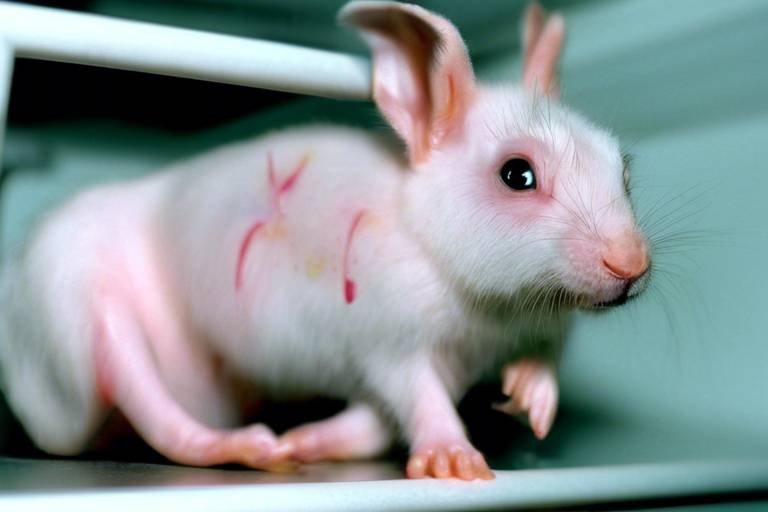Animal Testing and Ethics - A Philosophical Perspective
In recent years, the debate surrounding animal testing has intensified, igniting passionate discussions about the ethical implications of using animals in scientific research. This article aims to explore these ethical dilemmas from various philosophical perspectives, shedding light on the moral status of animals and the potential alternatives to animal experimentation. As we delve into this complex issue, we will examine the historical context, philosophical theories, and public perception that shape our understanding of animal rights and welfare.
Understanding the historical backdrop of animal testing is crucial for grasping its ethical implications. The practice of using animals for research dates back to ancient civilizations, where they were often used to study anatomy and physiology. Over the centuries, societal attitudes towards animals have evolved, influenced by cultural, religious, and scientific developments. In the 19th century, the rise of modern medicine and the scientific method led to an increase in animal experimentation, often justified by the potential benefits to human health. However, this surge in experimentation also sparked ethical concerns that continue to resonate today.
To navigate the murky waters of animal rights, we must turn to key philosophical theories that provide a framework for evaluating the morality of animal testing. Three predominant theories come into play: utilitarianism, deontology, and virtue ethics. Each of these perspectives offers unique insights into the ethical considerations of animal testing, challenging us to reflect on the moral obligations we hold towards non-human beings.
At the heart of utilitarianism lies the greatest happiness principle, which posits that actions are right if they promote the greatest overall happiness. In the context of animal testing, this raises a critical question: does the suffering inflicted on animals justify the potential benefits to human society? Proponents of utilitarianism argue that if animal testing leads to significant medical breakthroughs, the overall benefits may outweigh the costs. However, this perspective invites scrutiny regarding the value of animal lives versus human lives.
Consequentialist arguments focus on the outcomes of actions rather than the actions themselves. In evaluating animal testing, one must consider the effectiveness of this practice in achieving advancements in human health. For instance, animal testing has contributed to the development of vaccines and treatments for various diseases. Yet, the question remains: at what cost? The suffering endured by animals during experiments often raises ethical concerns that cannot be easily dismissed, leading many to question whether the ends truly justify the means.
Critics of utilitarianism argue that this approach can lead to a troubling neglect of individual animal rights in favor of collective human benefits. By prioritizing overall happiness, utilitarianism may inadvertently justify practices that cause significant harm to individual animals. This critique highlights the importance of considering the moral status of animals as sentient beings with their own interests and rights. As we reflect on the implications of animal testing, we must ask ourselves whether it is ethical to sacrifice the well-being of individual animals for the potential benefit of the many.
In contrast to utilitarianism, deontological ethics posits that certain actions are inherently right or wrong, regardless of their consequences. Deontological thinkers argue against animal testing based on moral duties to non-human beings. They emphasize that animals, as sentient creatures, possess intrinsic rights that should not be violated for human gain. This perspective challenges us to reconsider our ethical obligations towards animals and to recognize that their suffering is not merely a means to an end.
As ethical concerns surrounding animal testing continue to rise, exploring alternatives becomes essential. Innovative methods such as in vitro testing, computer modeling, and human-based research have emerged as viable options that aim to replace animal experimentation. These alternatives not only address ethical concerns but also hold the potential for more accurate and relevant results in understanding human biology and disease. Embracing these methods may pave the way for a more humane approach to scientific inquiry.
Public perception significantly influences animal testing practices. Advocacy groups, social media campaigns, and changing societal values play a crucial role in shaping policies and regulations regarding animal experimentation. As awareness of animal rights grows, many consumers are demanding transparency and ethical practices from companies and research institutions. This shift in public sentiment can lead to significant changes in how animal testing is conducted, pushing for more humane alternatives and stricter regulations.
Looking ahead, the future of animal testing ethics is likely to be shaped by potential legal reforms, technological advancements, and shifts in societal values. As more people advocate for animal rights and demand ethical treatment, we may see a decline in the reliance on animal testing in favor of more humane and effective research methods. The ongoing dialogue surrounding this issue is vital, as it encourages us to reflect on our moral responsibilities towards non-human beings and to consider how we can create a more compassionate world.
- What is the main ethical concern regarding animal testing? The primary ethical concern is the suffering inflicted on animals for human benefit, raising questions about their moral status and rights.
- Are there effective alternatives to animal testing? Yes, alternatives such as in vitro testing, computer modeling, and human-based research are being developed to reduce or replace animal experimentation.
- How does public perception impact animal testing practices? Public sentiment can influence regulations and policies, pushing for more humane treatment of animals in research.

The Historical Context of Animal Testing
Understanding the historical backdrop of animal testing is crucial for grasping its ethical implications. The practice of using animals for experimentation dates back thousands of years, with roots in ancient civilizations. For instance, the ancient Greeks, including notable figures like Aristotle and Galen, conducted dissections and observations of animals to better understand human anatomy and physiology. This early curiosity laid the groundwork for future scientific inquiry, but it also sparked ethical debates that continue to this day.
As we moved into the Middle Ages, the use of animals in scientific research became more formalized, yet it remained largely unregulated. The Renaissance brought a renewed interest in anatomy and physiology, leading to more systematic studies involving animals. The Enlightenment era further propelled scientific exploration, with thinkers like René Descartes proposing that animals were mere machines without feelings, which justified their use in experiments. This perspective, however, was met with opposition from those who began to advocate for animal rights, arguing that sentient beings deserve moral consideration.
By the 19th century, the industrial revolution and advancements in medicine spurred a significant increase in animal testing. The development of vaccines and surgical techniques often relied on animal experimentation, raising questions about the balance between scientific progress and ethical responsibilities. In 1876, the UK passed the Cruelty to Animals Act, marking one of the first legal attempts to regulate animal experimentation. This act required researchers to obtain licenses and demonstrate that their work was necessary, reflecting a growing awareness of animal welfare.
Fast forward to the 20th century, and we see a dramatic shift in public perception and legislative measures. The rise of the animal rights movement in the 1970s, spearheaded by groups such as the Animal Liberation Front and PETA, challenged the status quo and demanded more humane treatment of animals in research. This movement was pivotal in reshaping societal attitudes toward animal testing, leading to stricter regulations and the establishment of ethical review boards in research institutions.
Today, the historical context of animal testing serves as a reminder of the ongoing ethical dilemmas we face. The evolution of societal attitudes towards animals has prompted a reevaluation of the moral status of non-human beings. While animal testing has contributed to significant medical advancements, it has also raised profound ethical questions about the rights of animals and the responsibilities of humans. Understanding this historical journey is vital for anyone looking to engage in the current debates surrounding animal experimentation.
In summary, the historical context of animal testing reveals a complex interplay between scientific advancement and ethical considerations. As we continue to navigate this landscape, it’s essential to reflect on the lessons learned from the past to inform our future decisions regarding animal research.

Philosophical Theories on Animal Rights
When we dive into the deep waters of animal rights, we find ourselves navigating through a sea of philosophical theories that shape our understanding of morality and ethics. These theories offer different perspectives on whether animals deserve rights, and if so, what those rights entail. To make sense of this complex issue, we can look at three main philosophical frameworks: utilitarianism, deontology, and virtue ethics. Each of these theories presents unique arguments that can either support or condemn the practice of animal testing.
First up is utilitarianism, a theory that emphasizes the greatest happiness principle. This viewpoint suggests that the morality of an action is determined by its consequences. In the context of animal testing, utilitarians weigh the suffering inflicted on animals against the potential benefits to human health and well-being. The question arises: is it acceptable to cause harm to a few for the greater good of many? Utilitarianism often leads to heated debates, especially when we consider the balance of suffering versus benefits. For instance, if animal testing leads to groundbreaking medical advancements, does that justify the pain endured by the animals? This is where the consequentialist arguments come into play, as they focus on outcomes rather than intentions.
However, utilitarianism isn't without its critics. Many argue that this approach overlooks the rights of individual animals, treating them merely as instruments for human benefit. This brings us to the critiques of utilitarianism, which challenge its focus on overall happiness. Critics assert that by prioritizing human benefits, we risk neglecting the inherent value of animal lives. After all, can we really measure happiness and suffering on a scale? This raises profound questions about our moral obligations to non-human beings and whether they should be considered in ethical discussions.
Next, we shift our focus to deontological ethics. Unlike utilitarianism, which is outcome-oriented, deontological theories argue that certain actions are categorically right or wrong, regardless of their consequences. From this perspective, animal testing is inherently unethical because it violates our moral duties to treat animals with respect and dignity. Deontologists would argue that animals, like humans, possess intrinsic value and that causing them harm is fundamentally wrong. This perspective urges us to consider our moral responsibilities towards animals, prompting us to ask: do we have a duty to protect those who cannot protect themselves?
Lastly, we have virtue ethics, which emphasizes the character and intentions of the moral agent rather than specific actions. Virtue ethicists would argue that a compassionate and empathetic individual would not engage in practices that cause suffering to animals. This perspective encourages us to cultivate virtues such as kindness and respect towards all living beings, leading to a more humane approach to animal testing. It challenges us to reflect on our values and the kind of society we want to create. As we ponder these philosophical theories, it's essential to recognize that our views on animal rights are not just theoretical; they have real-world implications that impact legislation, scientific research, and societal norms.
In summary, the philosophical theories surrounding animal rights provide a rich tapestry of ideas that help us navigate the complex ethical landscape of animal testing. Whether we lean towards utilitarianism, deontology, or virtue ethics, the conversation is far from over. Each perspective offers valuable insights that can guide our understanding and treatment of animals in research and beyond.
- What is animal testing? Animal testing refers to the use of non-human animals in experiments to test the safety and effectiveness of products, including pharmaceuticals and cosmetics.
- Why is animal testing controversial? It raises ethical concerns about the treatment of animals, their rights, and whether the benefits to humans justify the suffering inflicted on these creatures.
- Are there alternatives to animal testing? Yes, alternatives include in vitro testing, computer modeling, and human-based research methods that do not involve animals.
- How do philosophical theories influence animal rights? Different philosophical frameworks shape our understanding of animal rights, guiding our ethical considerations and influencing laws and regulations regarding animal testing.

Utilitarianism and Animal Welfare
Utilitarianism, a philosophical theory that champions the greatest happiness for the greatest number, presents a compelling yet controversial framework for evaluating the ethics of animal testing. At its core, this approach hinges on the balance between the suffering inflicted on animals and the potential benefits to human beings. So, what does this mean in the context of animal welfare? Essentially, utilitarianism asks us to weigh the pain endured by animals against the possible advancements in human health and well-being.
Proponents of utilitarianism argue that if animal testing leads to significant medical breakthroughs—such as vaccines or treatments for serious diseases—the temporary suffering of animals may be justified. They contend that the end result, which could save countless human lives, outweighs the moral cost of using animals in research. For instance, consider the development of insulin for diabetes management. Many would argue that the benefits to human health derived from animal testing in this case far exceed the ethical dilemmas posed by the practice itself.
However, this perspective is not without its critics. Detractors of utilitarianism raise poignant questions: can we truly quantify suffering? Is it ethical to sacrifice the well-being of one species for the benefit of another? The challenge lies in the subjective nature of suffering; what one person sees as a minor inconvenience, another may view as a profound injustice. This brings us to the heart of the utilitarian debate—how do we measure happiness and suffering across different species?
To illustrate this, let's consider a simple table that highlights the contrasting views within the utilitarian framework:
| Argument | Pros | Cons |
|---|---|---|
| Animal Testing for Human Benefit | Can lead to medical advancements, saves human lives. | Inflicts suffering on sentient beings, potential for abuse. |
| Alternatives to Animal Testing | Reduces animal suffering, promotes ethical research methods. | May not provide the same level of insight into complex biological systems. |
Ultimately, the utilitarian approach to animal welfare is a double-edged sword. It challenges us to think critically about our responsibilities toward other sentient beings while also pushing the boundaries of scientific progress. As we navigate this complex moral landscape, it becomes increasingly essential to consider not only the outcomes of animal testing but also the ethical implications of the methods we choose to employ.
In conclusion, while utilitarianism offers a framework for justifying animal testing in the name of human welfare, it also raises significant ethical questions that demand our attention. Are we willing to accept the suffering of animals for the sake of human advancement? Or should we prioritize the rights and welfare of non-human beings, seeking alternatives that do not involve their sacrifice? These are the questions that lie at the heart of the ongoing debate surrounding animal testing and ethics.
- What is utilitarianism? Utilitarianism is a philosophical theory that suggests that the best action is the one that maximizes overall happiness or well-being.
- How does utilitarianism apply to animal testing? Utilitarianism evaluates animal testing by weighing the benefits to human health against the suffering experienced by animals.
- What are some alternatives to animal testing? Alternatives include in vitro testing, computer modeling, and human-based research methods.
- Why is animal welfare important in the context of testing? Animal welfare is crucial because it raises ethical considerations about the treatment of sentient beings and their rights.

Consequentialist Arguments
When we dive into the world of ethical debates surrounding animal testing, consequentialism takes center stage. This philosophical approach focuses on the outcomes of our actions rather than the actions themselves. In the context of animal testing, the key question is: do the benefits to human health and scientific advancement outweigh the suffering inflicted on animals? This question isn’t just a matter of numbers; it’s a moral balancing act that weighs the potential for human progress against the pain experienced by sentient beings.
Supporters of animal testing often argue that the advancements in medicine and science derived from such practices are irrefutable. For instance, many life-saving drugs and treatments have been developed through research that involved animal testing. Proponents might present a table like the following to illustrate the impact of animal research on human health:
| Year | Breakthrough | Animal Model Used |
|---|---|---|
| 1921 | Insulin Discovery | Dogs |
| 1950s | Polio Vaccine | Monkeys |
| 1980s | HIV/AIDS Treatment | Rats |
| 2000s | Gene Therapy | Mice |
This table showcases how animal research has paved the way for significant medical breakthroughs. However, it's essential to consider the other side of the coin. Critics of animal testing argue that the suffering of animals often goes unnoticed in the pursuit of human benefits. They contend that the pain, distress, and sometimes death of these animals is a steep price to pay, especially when the effectiveness of animal models in predicting human responses is increasingly questioned.
To further complicate the discussion, we must ask ourselves: are there truly no alternatives? With the advent of modern technologies, such as computer modeling and in vitro testing, some argue that we can achieve similar, if not better, results without the ethical dilemmas posed by animal testing. The consequentialist argument thus becomes twofold: not only do we have to weigh the benefits against the suffering, but we also need to consider whether we can achieve those benefits without causing harm.
In essence, the consequentialist framework provides a lens through which we can evaluate animal testing. It challenges us to reflect on the broader implications of our actions. Are we genuinely prioritizing human health, or are we sacrificing our ethical responsibilities toward other living beings? As we navigate these murky waters, it's vital to engage in open discussions about the ethical ramifications of our choices, ensuring that we don't overlook the voices of those who cannot speak for themselves.
In conclusion, while the consequentialist arguments present a compelling case for animal testing based on potential human benefits, they also raise critical ethical questions that demand our attention. The dialogue surrounding this issue is ongoing and complex, requiring us to balance scientific progress with our moral obligations to all sentient beings.
- What is consequentialism? Consequentialism is a philosophical theory that judges the rightness or wrongness of actions based on their outcomes or consequences.
- How does consequentialism relate to animal testing? In the context of animal testing, consequentialism evaluates whether the benefits to human health outweigh the suffering inflicted on animals.
- Are there alternatives to animal testing? Yes, alternatives include in vitro testing, computer simulations, and human-based research methods that aim to replace animal experimentation.
- What are the ethical concerns regarding animal testing? Ethical concerns revolve around the suffering of animals, the validity of animal models in predicting human responses, and the moral obligations we have towards non-human beings.

Critiques of Utilitarianism
Utilitarianism, with its core belief in maximizing happiness for the greatest number, has been a dominant philosophical framework in discussions about animal testing. However, it is not without its critics. One of the key critiques revolves around the concept of individual rights. Critics argue that utilitarianism often overlooks the intrinsic value of individual beings, reducing them to mere numbers in a calculation of overall happiness. This is particularly concerning when we consider animals, who, like humans, experience pain and suffering. By prioritizing the collective good, utilitarianism may inadvertently justify the suffering of a few for the benefit of many, which raises serious ethical questions.
Additionally, the problem of measurement poses a significant challenge to utilitarian ethics. How do we accurately measure happiness or suffering? Critics point out that such measurements are inherently subjective and can vary widely from one individual to another. For instance, the pain experienced by an animal during testing cannot be easily quantified, nor can the potential benefits to human beings be guaranteed. This uncertainty leads to a slippery slope where the justification for animal testing could hinge on questionable data and assumptions.
Moreover, critics highlight that utilitarianism tends to favor short-term gains over long-term consequences. In the context of animal testing, this could mean prioritizing immediate human benefits—like new medical treatments—while ignoring the long-term implications of normalizing animal suffering. As society evolves, our understanding of animal intelligence and emotional capacity is deepening, prompting questions about whether it is ethical to continue practices that may have been acceptable in the past.
To illustrate this point, consider the following table, which summarizes the primary critiques of utilitarianism in the context of animal testing:
| Critique | Description |
|---|---|
| Overlooking Individual Rights | Utilitarianism may justify animal suffering for the greater good, neglecting the rights of individual animals. |
| Measurement Issues | Measuring happiness and suffering is subjective and can lead to inaccurate conclusions. |
| Short-term Focus | Emphasizes immediate benefits while ignoring long-term ethical implications and societal changes. |
In conclusion, while utilitarianism offers a framework for evaluating the ethics of animal testing, its critiques highlight significant flaws that cannot be ignored. The challenge lies in balancing the benefits to humanity with a moral obligation to respect and protect the rights of non-human beings. As we continue to grapple with these ethical dilemmas, it is essential to consider alternative ethical frameworks that may provide a more comprehensive understanding of our responsibilities toward animals.
- What is utilitarianism? Utilitarianism is a philosophical theory that suggests the best action is the one that maximizes overall happiness or pleasure.
- Why is animal testing controversial? Animal testing is controversial because it raises ethical concerns about the suffering of animals versus the potential benefits to human health.
- What are some alternatives to animal testing? Alternatives include in vitro testing, computer modeling, and human-based research methods.

Deontological Perspectives on Animal Testing
Deontological ethics, rooted in the philosophical works of Immanuel Kant, asserts that some actions are inherently right or wrong, regardless of the consequences they produce. This moral framework emphasizes the importance of duty and adherence to ethical principles. When it comes to animal testing, deontologists argue that subjecting animals to experimentation violates their intrinsic rights and dignity. They believe that animals, like humans, possess a moral status that must be respected. This perspective challenges the idea that the ends justify the means, a common argument in favor of animal testing.
According to deontological thinkers, the act of using animals for experimentation is fundamentally wrong because it treats them as mere tools for human benefit. This viewpoint raises important questions: Should we exploit sentient beings for our own purposes? Are we justified in inflicting pain and suffering on animals in the name of science? Deontologists would argue that moral duties extend beyond human beings and encompass all sentient creatures.
To further illustrate this perspective, consider the following key points:
- Moral Duty: Deontologists believe we have a moral obligation to treat all living beings with respect and compassion. This means refraining from causing harm to animals, regardless of the potential benefits to humans.
- Inherent Value: Animals possess inherent value, which should not be diminished by their utility in research. This notion challenges the commodification of animals in scientific contexts.
- Rights of Animals: Just as humans have rights that protect them from exploitation, deontologists argue that animals should also have rights that safeguard them from harm and suffering.
Critics of animal testing often highlight the emotional and psychological distress that animals endure in laboratory settings. Deontologists would argue that this suffering is unacceptable, as it violates the moral duty we have towards these beings. Moreover, the deontological perspective prompts us to reconsider our relationship with animals, urging a shift from viewing them as resources to recognizing them as fellow sentient beings deserving of ethical consideration.
In conclusion, the deontological perspective on animal testing presents a compelling argument against the practice. By emphasizing moral duties and the inherent rights of animals, this ethical framework challenges us to rethink our responsibilities towards non-human beings. As society continues to grapple with the ethical implications of animal experimentation, deontological ethics serves as a crucial lens through which we can evaluate the morality of our actions.
- What is deontological ethics? Deontological ethics is a moral philosophy that focuses on the inherent rightness or wrongness of actions, rather than their consequences.
- Why do deontologists oppose animal testing? Deontologists oppose animal testing because they believe it violates the moral duties we have towards animals, treating them as mere means to an end.
- Are there alternatives to animal testing? Yes, alternatives include in vitro testing, computer modeling, and human-based research methods that do not involve animal suffering.

Alternatives to Animal Testing
As the ethical concerns surrounding animal testing continue to rise, it's crucial to explore viable alternatives that can replace traditional methods. The scientific community is increasingly recognizing that animal testing is not the only path to medical advancement. In fact, innovative technologies and methodologies are paving the way for more humane and effective research practices. By embracing these alternatives, we can not only enhance our ethical standards but also improve the reliability of our findings.
One of the most promising alternatives is in vitro testing. This method involves studying biological processes in a controlled environment outside of a living organism, often using cells or tissues. This approach allows researchers to observe cellular responses to drugs and treatments without causing harm to animals. For instance, researchers can use human cell cultures to assess toxicity levels, which can provide more relevant data than animal models, given the biological differences between species.
Another innovative alternative is computer modeling. With advancements in technology, scientists can now simulate human biological systems using sophisticated algorithms. These models can predict how a drug will behave in the human body, significantly reducing the need for animal testing. This method not only saves lives but also accelerates the drug development process. Imagine being able to test thousands of compounds in a virtual environment before moving to clinical trials; this is the future we are heading toward!
Moreover, there is a growing emphasis on human-based research. Techniques such as microdosing allow researchers to administer tiny doses of a drug to human volunteers, providing insights into its effects without the extensive animal testing typically required. This method is particularly beneficial for assessing pharmacokinetics—the way drugs move through the body—ensuring that human responses are prioritized over animal data.
While these alternatives show great promise, it’s essential to acknowledge that transitioning away from animal testing will require substantial investment in research and development. Governments, institutions, and private sectors must collaborate to fund these innovative methods fully. The shift toward alternatives not only aligns with ethical considerations but also reflects a growing societal demand for humane research practices.
In conclusion, the alternatives to animal testing are not just theoretical concepts; they represent a real shift in how we approach scientific research. By adopting in vitro testing, computer modeling, and human-based research, we can move toward a future where the ethical treatment of animals and the advancement of science go hand in hand. This is not just a win for animals; it's a win for humanity as we strive for more accurate and effective medical breakthroughs.
- What are the main alternatives to animal testing? The main alternatives include in vitro testing, computer modeling, and human-based research methods.
- Are alternatives to animal testing as effective? Yes, many alternatives can provide more relevant data for human health than traditional animal testing.
- How can I support the shift away from animal testing? You can support this shift by advocating for ethical research practices, funding alternative research, and raising awareness about the importance of humane treatment of animals in science.

Public Perception and Advocacy
Public perception plays a pivotal role in shaping the landscape of animal testing practices. Over the years, societal attitudes toward the use of animals in research have evolved dramatically, influenced by a myriad of factors including ethical considerations, scientific advancements, and cultural shifts. In today's world, where information is readily available at our fingertips, the power of public opinion can no longer be underestimated. Advocacy groups have emerged as crucial players in this arena, tirelessly working to raise awareness and challenge the status quo.
One of the most significant impacts of public perception is the way it influences legislation and regulatory frameworks surrounding animal testing. For instance, as more people become aware of the ethical implications of animal experimentation, there has been a noticeable push for stricter regulations and even bans on certain practices. This change is not just a fleeting trend; it's a reflection of a growing consciousness about animal rights and welfare. Advocacy organizations, such as PETA and the Humane Society, have harnessed social media platforms to amplify their messages, reaching a broader audience and mobilizing support.
Moreover, the narratives surrounding animal testing have shifted dramatically. Once viewed primarily through a scientific lens, public discourse now encompasses emotional and ethical dimensions. People are increasingly asking questions like: Is it right to sacrifice animal lives for human benefits? and What alternatives exist that could achieve the same scientific advancements without causing harm? These questions resonate deeply, prompting individuals to reconsider their stance on animal testing.
Advocacy groups have utilized various strategies to engage the public, including:
- Educational Campaigns: Informing the public about the realities of animal testing and its ethical implications.
- Petitions and Protests: Mobilizing grassroots support for legislative changes and raising awareness through public demonstrations.
- Social Media Activism: Leveraging platforms like Twitter, Instagram, and Facebook to spread awareness and encourage dialogue.
These efforts have not only increased public awareness but have also led to tangible changes in corporate practices. Companies are now more likely to adopt cruelty-free policies, responding to consumer demand for ethically produced products. This shift illustrates the power of informed consumers who are willing to make choices that align with their values, further influencing the market and encouraging innovation in alternative testing methods.
As we look to the future, it is essential to recognize that public perception is not static. It evolves with time, influenced by new research, cultural shifts, and the tireless efforts of advocates. The dialogue surrounding animal testing must continue to include diverse perspectives to ensure that ethical considerations remain at the forefront of scientific advancement. By fostering a culture of empathy and understanding, we can work towards a future where animal welfare is prioritized, and innovative alternatives to testing are embraced.
- What is animal testing? Animal testing refers to the use of non-human animals in experiments to assess the safety and effectiveness of products, primarily in the fields of medicine and cosmetics.
- Why is public perception important in animal testing? Public perception influences legislation, corporate policies, and the overall ethical landscape surrounding animal testing. Increased awareness can lead to stricter regulations and a shift towards alternative methods.
- What are some alternatives to animal testing? Alternatives include in vitro testing, computer modeling, and human-based research, which aim to reduce or eliminate the need for animal subjects in experiments.
- How can I support animal rights? You can support animal rights by educating yourself, advocating for policy changes, choosing cruelty-free products, and supporting organizations that work towards animal welfare.

Future Directions in Animal Testing Ethics
The landscape of animal testing ethics is rapidly evolving, influenced by advancements in technology, changing societal values, and increasing awareness of animal rights. As we look toward the future, several key trends and considerations emerge that could reshape our approach to animal experimentation. One significant direction is the potential for legal reforms that could impose stricter regulations on animal testing practices. Advocates argue that these reforms are necessary to ensure that animals are treated with dignity and respect, reflecting a growing consensus that animal welfare should be a priority in scientific research.
Moreover, the rise of technological advancements is paving the way for alternatives to traditional animal testing. Innovative methods such as in vitro testing, which utilizes human cells and tissues, and computer modeling techniques are becoming increasingly sophisticated. These alternatives not only promise to reduce the number of animals used in research but also aim to provide more relevant data for human health outcomes. For instance, advancements in artificial intelligence may enable researchers to simulate complex biological processes, offering insights that were previously unattainable through animal models.
Another vital aspect of the future of animal testing ethics is the shift in societal values. As public awareness of animal rights grows, there is a palpable demand for transparency in research practices. This demand is often amplified by social media, where advocacy groups can mobilize support and raise awareness about unethical testing methods. The public's increasing willingness to question the status quo means that companies and research institutions may need to adapt their practices to align with ethical expectations, potentially leading to a decline in animal testing overall.
Furthermore, the integration of human-based research is gaining traction. By focusing on human biology rather than relying on animal models, researchers can develop more effective therapies and treatments. This shift not only aligns with ethical considerations but also enhances the relevance of research findings. Nevertheless, it raises important questions about the balance between innovation and ethical responsibility. As we move forward, finding this balance will be crucial in determining the future of animal testing.
In summary, the future of animal testing ethics is poised for transformation driven by legal reforms, technological advancements, and evolving societal values. As these factors converge, they may create a new paradigm in which animal testing is significantly reduced, and the methods employed prioritize both ethical considerations and scientific efficacy. The ongoing dialogue between researchers, ethicists, and the public will play a pivotal role in shaping this future.
1. What are the main alternatives to animal testing?
Some of the main alternatives include in vitro testing, computer modeling, and human-based research methods that do not rely on animal subjects.
2. How can public perception influence animal testing regulations?
Public perception plays a crucial role in shaping policies and regulations. As awareness of animal rights increases, advocacy groups can pressure lawmakers to implement stricter regulations on animal testing.
3. What role does technology play in reducing animal testing?
Technology, particularly advancements in artificial intelligence and biological modeling, can create simulations that reduce the need for animal testing while providing relevant data for human health.
4. Are there ethical concerns with human-based research?
Yes, while human-based research can provide more relevant data, it also raises ethical concerns regarding consent, privacy, and the potential risks involved in such studies.
Frequently Asked Questions
- What is animal testing?
Animal testing refers to the use of non-human animals in experiments and research to assess the safety and efficacy of products, including pharmaceuticals, cosmetics, and household items. This practice has a long history and is often justified by the potential benefits to human health and safety.
- Why is animal testing considered ethical by some?
Some argue that animal testing is ethical because it can lead to significant medical advancements and the development of life-saving treatments. Proponents often cite the utilitarian perspective, suggesting that the benefits to human beings can outweigh the suffering inflicted on animals.
- What are the main philosophical arguments against animal testing?
Critics of animal testing often draw on deontological ethics, which argue that certain actions are inherently wrong, regardless of the outcomes. They contend that animals have rights and deserve to be treated with respect, thus opposing any form of experimentation that causes suffering.
- What alternatives exist to animal testing?
As ethical concerns grow, researchers are exploring alternatives such as in vitro testing, computer simulations, and organ-on-a-chip technologies. These methods aim to reduce reliance on animal models while still providing valuable data for human health research.
- How does public perception influence animal testing practices?
Public perception plays a crucial role in shaping policies related to animal testing. Advocacy groups and social media campaigns can raise awareness about ethical concerns, prompting changes in regulations and encouraging companies to adopt cruelty-free practices.
- What is the future of animal testing ethics?
The future of animal testing ethics may involve significant legal reforms and advancements in technology. As societal values shift towards greater compassion for animals, we may see a decline in traditional animal testing methods and an increase in innovative research approaches.


















